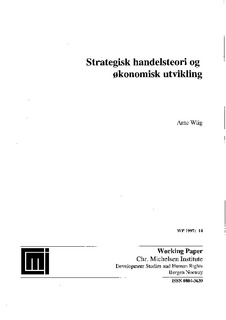| dc.contributor.author | Wiig, Arne | |
| dc.date.accessioned | 2008-03-03T12:24:29Z | |
| dc.date.accessioned | 2017-03-29T09:12:53Z | |
| dc.date.available | 2008-03-03T12:24:29Z | |
| dc.date.available | 2017-03-29T09:12:53Z | |
| dc.date.issued | 1997 | |
| dc.identifier.issn | 0804-3639 | |
| dc.identifier.uri | http://hdl.handle.net/11250/2435960 | |
| dc.description.abstract | This paper gives an overview of theories of strategic trade policies and discusses whether these theories are applicable as development strategies for developing countries. The general answer is no. The theories are partial and the policy prescriptions fragmented and depend strongly on the specification of model parameters. It is also argued that the government policies of developing countries, generally, are less credible than those of developed countries and that these countries generally are weak due to their size.
On the other hand, being a small actor also has its advantages which can be used strategically in markets characterized by imperfect competition. While being a small actor is an obstacle according to the Cournot model, it has an advantage under the alternative Bertrand model. One way of making oneself small is through product differentiation. The paper underlines the importance of developing countries entering markets characterized by product differentiation. | |
| dc.language.iso | nor | |
| dc.publisher | Chr. Michelsen Institute | |
| dc.relation.ispartofseries | CMI Working paper | |
| dc.relation.ispartofseries | WP 1997: 14 | |
| dc.subject | Trade policy | |
| dc.subject | Imperfect competition | |
| dc.subject | Development strategy | |
| dc.subject | Developing countries | |
| dc.title | Strategisk handelsteori og økonomisk utvikling | |
| dc.type | Working paper | |
